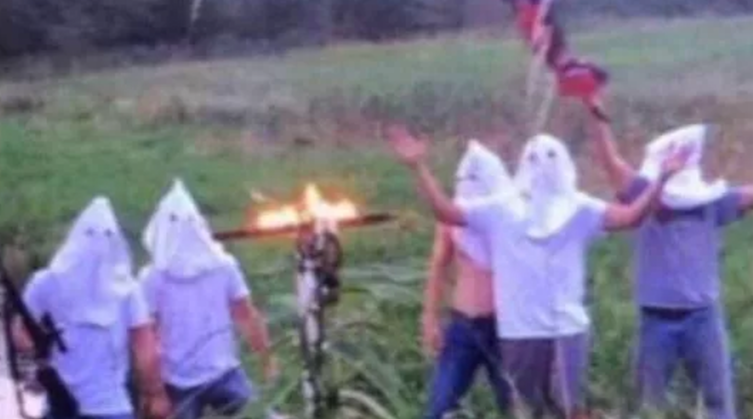When hate speech isn't a crime: Small-town football team faces this issue
In the midst of an ongoing national debate about the difference between free speech and hate speech, a First Amendment issue has surfaced in the wake of an abhorrent act by high school football players in Iowa.
Five students in the town of Creston staged a cross burning that was captured on social media earlier this month, with all of them wearing white hoods. One held what appeared to be a Confederate flag; another held what appeared to be an assault rifle.
The local newspaper, the Creston News-Advertiser, reported that the students in the photo were members of the high school football team.
“This isn’t what our students are about,” Creston High principal Bill Messerole told the Des Moines Register. “Our students are above this.” (A message to Messerole was not returned.)
Athletic director Jeff Bevins disciplined the students, according to the Register, but that’s where this becomes tricky. Because the students are minors, the school did not reveal what disciplinary action was taken. They have been removed from the football team. But as unsettling as the act was, it’s not clear that it’s legally appropriate for the school to mete out a punishment.
“What’s interesting about this situation,” says Mark Kende, director of the Constitutional Law Center at Drake University, “is they did something highly offensive, and it would be perceived as such by racial minorities, but it’s not at all clear they targeted those people.”
That’s where the fine line between free speech and hate speech becomes a third rail, and it has been debated by the highest court in the land. In 1992, the Supreme Court overturned the conviction of a teenager who burned a cross on the lawn of an African-American family. Then, in 2003, the Court struck down a Virginia statute that prohibited cross burning, based on the distinction between intimidation or direct threat and “messages of shared ideology.”
And this social media post didn’t specifically target anyone in the 7,800-person town or the 490-student school or anyone else. It wasn’t on school property. It’s not even clear that the students involved have a “shared ideology.”

“That’s why the arguments about disciplining are more complicated,” Kende says. “You don’t know whether they really had malicious intent or they just wanted attention. You don’t know if they’re aiming at someone.”
Which then begs the question: Isn’t a cross burning understood to be directed at minorities, specifically black people? Does it need to have a name or face or address to be considered a threat?
Kylan Smallwood, the 16-year-old quarterback of the team, is African-American. He told the Register he was “shocked” and “pretty mad, to be honest.” He said he had been to some of the involved players’ houses. No one could blame him for taking the act personally. However, personal standards are not always legal standards, and that’s where lawyers might enter the picture.
“If they’re not targeting [the quarterback] and they’re targeting minorities, it is disgusting but it’s not enough,” Kende says. “Maybe the response is, ‘There are only a couple black kids on the team.’ It’s close, but I’m not sure it’s there. It’s an open question.”
Further complicating the question is whether the social media post could be seen as a disruption to the learning environment at the school. That would open up other legal avenues.
Parents of one of the students in the photo have taken steps toward healing. Jamie Travis, whose son was one of those in the photo, hand-delivered a note to the News-Advertiser in order to “sincerely apologize for the strife we have caused this community.”
The letter continued: “The photo in no way reflects our family values. Our family strongly believes that all individuals are created equally in God’s eyes.”
The parents declared their support in the decision to remove their son from the football team.
“Our goal is a peaceful resolution,” the letter concluded. “We want to move forward and embrace our community in eliminating racism in Creston.”
Travis replied to an email from Yahoo Sports, however he declined comment for this story.
Can the town move forward? The Travis’ letter and Smallwood’s poise indicates a good start. The quarterback’s father, a mail carrier, received hugs on his route after the incident. But one reporter found three Confederate flags flying on one Creston street last week, and the same reporter tells of a family that left town five years ago because of racism.
The five students were in school last week, according to the Register. They are still off the football team.
“I see stuff like Charlottesville and I think, ‘That’s pretty messed up,’ ” Smallwood said. “But I never thought that it would happen to our small town.”
It is happening to Creston, but unfortunately it’s not the first time or the first town. And the Constitution could make things murkier, instead of clearer.
More from Yahoo Sports:
• Boxing judge punished for controversial scorecard
• Coach proposes dangerous fight for Ronda Rousey
• Charles Robinson: NFL TV ratings aren’t pretty so far
• NFL Power Rankings: Rookie changes Chiefs’ outlook
